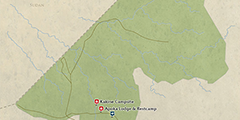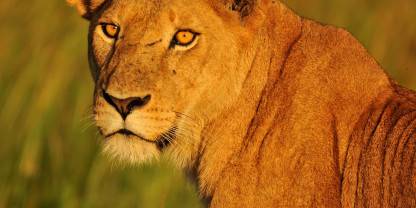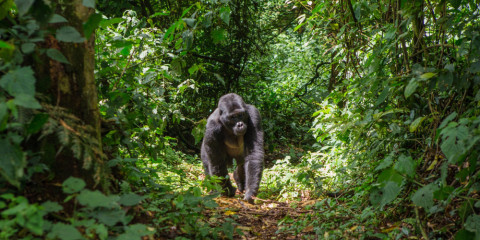Kidepo Valley National Park lies in the remote northeast corner of Uganda bordering South Sudan. It has a true wilderness feel and is home to a wide variety of wildlife, making it a great destination for adventurous safari-goers. Four of the Big Five are present (no rhino) along with several dry-country species that are rare or absent elsewhere in Uganda.

-
Best Time To Go
- September to March (Dry season)
-
High Season
- September to March (The park rarely gets crowded)
-
Size
- 1,442km² / 557mi²
-
Altitude
-
999-2,750m /3,278-9,022ft
 View Photos
View Photos
 View Photos
+24
Photos
View Photos
+24
Photos
 Open Map
Open Map
Pros & Cons
- Top wildlife viewing, especially in the Dry season
- Several mammal and bird species unrecorded elsewhere in Uganda
- Excellent birding with many birds of prey
- Lots of wilderness appeal
- Growing number of accommodations
- Spectacular views over the Narus Valley
- Road safaris combined with a visit to Ziwa Rhino and Wildlife Ranch offer a chance of spotting all the Big Five
- Very remote from Uganda’s other main parks
- Relatively expensive to visit
Wildlife
Kidepo has a very impressive mammal checklist. Twenty species of predator have been recorded, including several (cheetah and black-backed jackal) not found in other Ugandan national parks. Lions, leopards and spotted hyenas are also present. Other wildlife includes elephant, buffalo, plains zebra, Rothschild’s giraffe, patas monkey and 12 antelope species, some of which don’t occur anywhere else in the country. Kidepo is the only Ugandan national park inhabited by ostrich, the world’s largest bird.
More about Kidepo’s wildlifeScenery
The park is dominated by two valleys (Kidepo Valley and Narus Valley) on either side of predominantly mountainous terrain. There are wide, sweeping views of the Narus Valley from many vantage points. Open grassland is interspersed with acacia trees, desert date trees and rocky outcrops. The highest point in Kidepo is the 2,750m/9,022ft peak of Mt Morungole, which stands close to the three-way border with South Sudan and Kenya.
Activities
are the main activity. The most productive area is the central Narus River Valley, where you’re likely to see large buffalo herds, along with elephant, giraffe, zebra, warthog, patas monkey and possibly lion, leopard or cheetah. Wildlife is scarcer in the remote Kidepo River Valley, but for those with a few days in the park, it’s an interesting change of scene and the best place to look for ostriches. are offered at the park headquarters.
Weather & Climate
Kidepo has a semi-arid climate, occasionally experiencing drought in the Dry season (September to March). Average afternoon temperatures sit around 30°C/86°F, except in the park’s higher-altitude areas where it gets colder. The Wet season lasts from April to August. In these months, keep one eye on the sky in the afternoon, when showers often blow in and out.
More about the weather and climateBest Time To Visit
Sunny days and thin vegetation make the Dry season (September to March) the best time to watch wildlife in Kidepo. This is also when animals go searching for a dependable source of water. On the other hand, an advantage of exploring Kidepo when the rains come is that the dust and heat tend to get washed away, and the birding is better.
More about the best time to visit



